“Aporto! Aporto!” A child shouts as I whizz by on a motorbike taxi.
“Snap me, Aporto!”
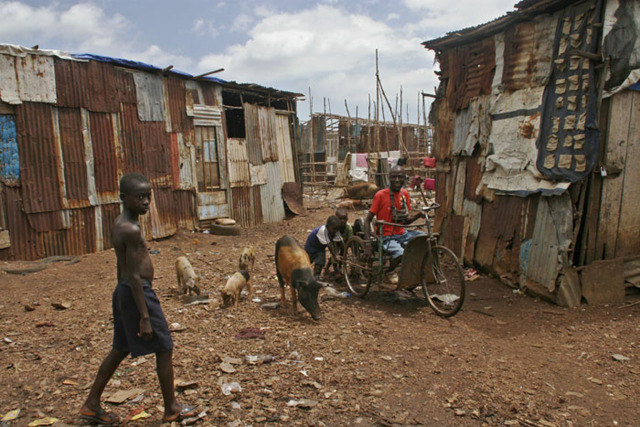
By Lucy Munday
People line the streets as they walk about their business, to school, or selling bread in the sweaty dust. We’re near the Congo and children have spotted the camera slung across my body. The bike picks up speed as we swing into traffic. I don’t have a helmet and neither does he.
In May 2013 I ventured to Makeni, Sierra Leone, to volunteer as a photographer for the NGO Street Child of Sierra Leone. The civil War that raged from 1991-2002 was well documented for the brutality and use of child soldiers. Today Sierra Leone is in economic growth with a decade of peace and for now, barrels of hope.
That is what I wrote in February this year before the Ebola outbreak swept across Central and Western Africa. Today I sit down to write a retrospective on my trip to Sierra Leone in 2013 in light of the current situation, and I begin watching the short film Douda’s story, produced by Street Child. Douda looks in to the camera and tells me he has lost his father, step mother, brother, sister and grandmother all in the space of less than a month. He wants to go to school but he’s now got to look after the younger members of his family. He breaks down in grief-stricken tears. After I finish watching it, I am unable to find the words that will do justice to the thousands of people dying of Ebola not just in Sierra Leone, but all across Africa. You can watch Douda’s story here.
It’s raining outside and I am sitting in my warm kitchen eating a ham salad, but I’ve now lost my appetite. There is much more to Sierra
Leone than civil war and Ebola, but once again Sierra Leone is on the world stage for tragic reasons. Is anybody listening?
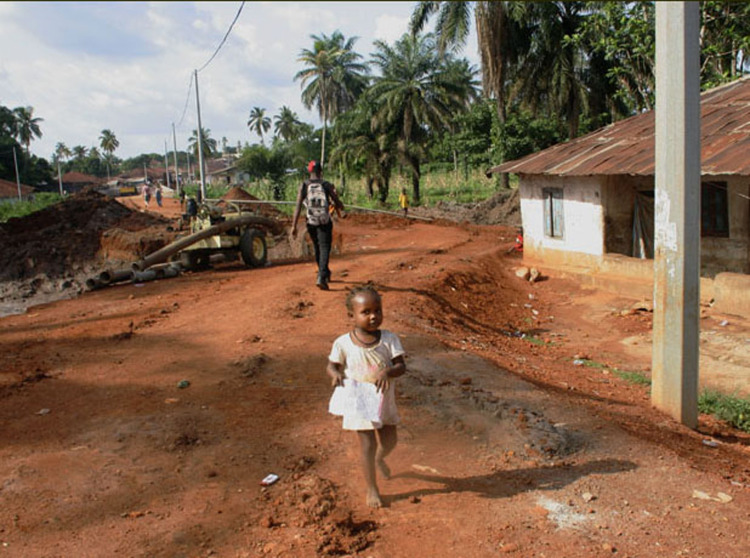
I was approached online in April 2013 by Street Child through Escape the City. They needed volunteers to help organise a marathon they were hosting in Sierra Leone, was I interested? Aside from being taken aback – ‘Sierra Leone? Wasn’t that the really dangerous country that had played host to some of the biggest atrocities in a vicious civil war only a few years ago?’- I was interested. I look back on my assumptions of a country I knew very little about and think how ignorant I was. I admit my selfish motivation to go, was that I thought I could gain personal growth from it. I did, it was an eye opening experience, but I see now that there is so much more to helping people in desperate poverty than what personal gratification you can attain from doing your daily good dead and ticking boxes.
I was given a free flight to Sierra Leone and I spent five days helping to set up the small final tasks involved with a large sporting event like this. Actually there is no sporting event like one hosted by a charity in a third world country. There is no budget and having worked in events since then I am still amazed with the level of production that the team managed. During the marathon I sat under a tree in the blistering heat photographing marathon runners crossing the finish line.
Journal entry May 26th 2013 – “I began to feel sorry for the remaining runners slogging it out on the course. Not only were they running a huge distance, they were doing it on varying terrain in great humidity and under a burning sun. Suddenly running the London marathon seemed far more achievable than usual.”
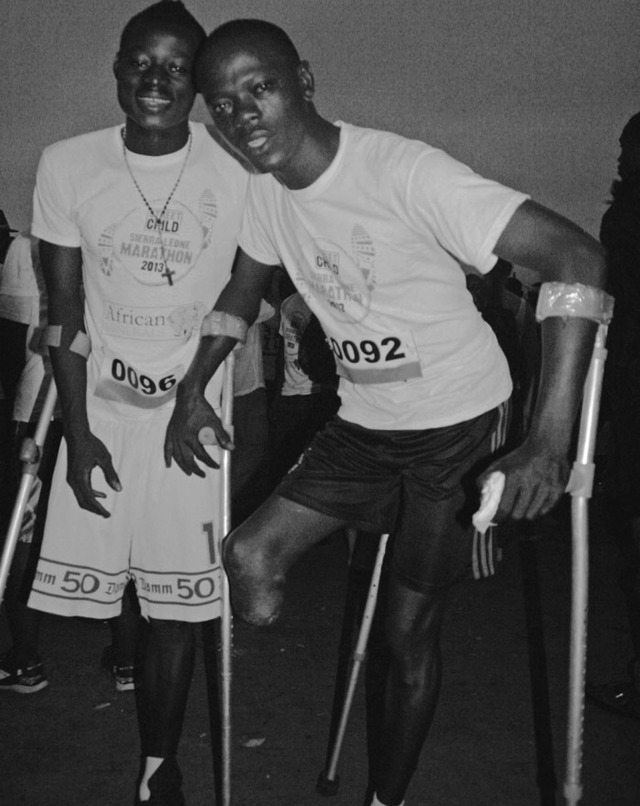
By the end of the week I had experienced slums, Sierra Leonean hospitality, sweating like never before in my life, calls of ‘Aporto’, bucket showers and bucket toilets. The poverty was what really threw me. The slums are shanty towns, feces lie open in the street, children play football in open muddy plains next to the sea. There is almost zero access to education or basic hygiene facilities. I was no longer thinking how boring it was to return to my home country after extended periods of travel. I realised I was so lucky to be from a wealthy Western country.
Journal entry May 28th 2013: “I can’t help but feel that Sierra Leone is a misunderstood country with a very sad past and uncertain present. It has some really dark aspects to it. I was thrown in the deep end and saw only a tiny fragment of this. I also saw a country trying to piece itself back together.”
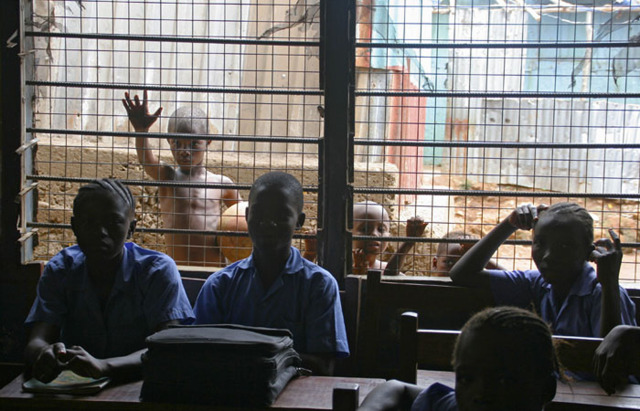
The focus on the very few aid workers and nurses from the USA, UK and Spain, who have contracted Ebola and have been supported by their families, by their health care systems and by their strong economies in turn, is incredibly far removed from what people in Sierra Leone are going through. It’s predicted that as many as 10,000 orphans will be living on the streets and possibly starving to death as a direct result from the Ebola outbreak in Africa.
In 2013 I talked to one of Street Child’s in-country aid workers, Ahmed, who goes out to Makeni’s slums each night in a team and talks to children who are sleeping on the streets or working in the sex trade. He spoke to me of the effects the civil war had for the thousands of forced child soldiers. They grew up stigmatised, uneducated, outcast and found their way, by and large, into a dangerous micro economy providing unlicensed motorbike taxis to the general public.
At the time he told me, with his eyes resting on a cotton tree behind my back, “[Where there is] a lack of proper of nurturing, they are not engaging in all forms of business and not law abiding. They were not given new skills or guidance. Most don’t know the rules of the road.”
The thought of contracting this death sentence of a disease is a major factor in the stigmatisation of orphans in these countries. Can you imagine this happening in America or England?
The likelihood that Douda will get the education he wants, or that his young siblings can go to school, will be incredibly unlikely now that they have to fend for themselves. He is also only one of hundreds of thousands of people whose lives will never be the same because of this.
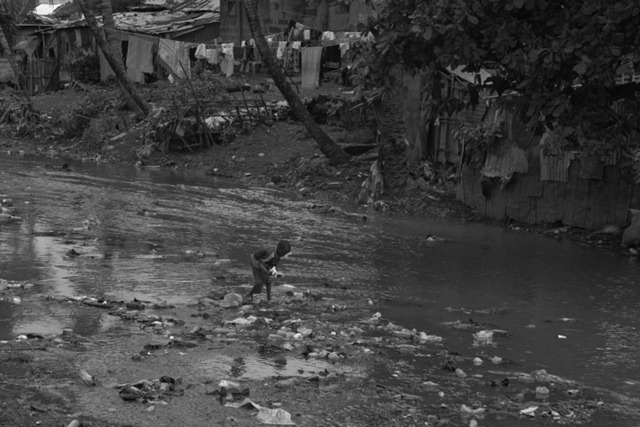
Street Child of Sierra Leone is an NGO based in the UK. They provide children working and living on the streets the opportunity to reconnect with family and gain an education. For further information on Street Child, or to donate to their Ebola Crisis appeal please go to their website at www.street-child.co.uk and also to Facebook at https://www.facebook.com/hashtag/ebolaorphanappeal
 About the Author
About the Author
Lucy is a UK based traveller, writer, photographer, coffee snob and stew expert. She has lived and worked in Austria, New Zealand, Australia and Bali and hopes the list will get longer. On her travels she discovered her concerns with environmentalism, and feminism and her love of writing and travel is a bug that won’t stop biting. Her favourite food is anything from everywhere, plus a glass of red wine. She loves Asian sunrises, European mountains and scuba diving in her beloved Asia. She is currently studying the NCTJ in Journalism.


